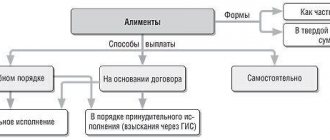Home » Division of property » Division of children during divorce
6
If a family has joint minor children, then divorce is possible only through the court. With such a divorce, it is often quite painful to resolve the issue of with whom the children will live after the divorce. There are often cases when disputes about with whom minors will live arise not so much from the desire to create better conditions for the child, but from the desire to take at least some revenge on the former spouse.
Is it possible to separate children in a divorce?
Lawyers do not use the concept of “division of children,” and how can a child be divided? The issue of determining or changing the place of residence of minor family members is being considered.
However, during a divorce, if there are several children in a family, the question often arises: is it possible to divide the children: give one child to raise one child, and the other to raise another? The legislation does not prohibit the division of children between parents, nor does it provide recommendations for their mandatory division. In each specific case, the issue is resolved primarily based on the interests of the children.
For example, the former spouses had a girl and a boy during their marriage. After the divorce, the daughter wanted to stay with her mother, and the son said that he wanted to live with his dad. The parents, after consulting, decided to meet the children halfway and maintain normal relations between themselves, so that the children would feel comfortable communicating with each other and with both parents. This is the most optimal solution of all possible in this situation.
All circumstances and nuances are taken into account, including the financial situation, lifestyle of each parent, their moral qualities, the desire of the child and his age.
For example, all things being equal, the court is unlikely to hand over a one-year-old child to be raised by his father, but a fifteen-year-old teenage boy has every chance of living with his father if he shows his sincere desire in court, and the father proves that his son will be better off with him.
What does the Family Code say about the division of children?
The Family Code contains a whole block of articles (Section No. 11: 54-60) on the rights of minors: to stay in the family, to contact with close relatives, to express thoughts, to protection. But what about the situation when parents are unable to continue living a common life and want to break the marriage bond?
The topic of dividing children during divorce is ambiguous and not entirely ethical. First of all, we have to take into account human dignity, property, civil and personal interests of everyone. The law defines:
- the specifics of holding meetings in the presence and with the direct participation of minors;
- procedural responsibilities and the role of relevant specialists to determine their place of residence.
All cases are considered based on the law, but purely individually. Practice shows that refusals/satisfaction come with the most similar circumstances when they are considered by different judges.
Standard procedural actions inherent in any category of claims accepted for legal proceedings are considered in the Civil Procedure Code. The formation of a package of documents and the choice of authority should be carried out in accordance with generally accepted and highly specialized standards.
How to divide children in divorce?
The legislation of the Russian Federation allows two ways to resolve this issue:
- Settlement agreement.
- Applying to the judicial authorities with a claim to determine the child’s place of residence, the procedure for communicating with the second parent, and incurring material expenses for his maintenance.
Settlement agreement
The most reasonable and painless option for dividing children is a settlement agreement. In the document, parents provide for all the nuances of raising and living with children that arise during a divorce:
- with whom the child will remain in the future;
- decide how the son or daughter will communicate with the other parent;
- what participation the separated parent will take in the upbringing of the minor;
- what expenses will both parents bear to support the child?
The Magistrate's Court reviews this agreement and approves it. But if the parents’ agreements somehow infringe on the interests of the children, the magistrate’s court may refuse to approve the agreement.
For example, the former spouses agreed that their son would live with his mother for six months and with his father in a neighboring city for six months. The boy must go to first grade in a year, and this regime will not allow him to quickly adapt to two schools at once. Before a child has time to get used to one school and find friends in one class, he will have to move to another city and get used to a different social circle. This can negatively affect both the child’s education and his psychological state. Based on this, the magistrate court refused to certify this agreement.
It’s great if ex-spouses can come to a compromise on issues of upbringing and place of residence of the child, when they can sensibly assess the situation and put the interests of the little citizen above their own. But, unfortunately, this does not always happen; sometimes mutual claims do not allow reaching a compromise.
Trial
In cases where ex-spouses cannot “step on the throat of their own song” even in the interests of their child and cannot agree, legal proceedings remain. In this case, they face a long and difficult trial, which often involves relatives, guardianship authorities, educators and teachers, and, most importantly, minor children.
Statement of claim
Any legal proceedings are preceded by a statement of claim to the court. Simultaneously with the claim to determine the child’s place of residence, it is advisable to file a claim for alimony.
The claim must include the following information:
- Court details.
- Personal data of all parties to the process.
- Information about the guardianship and trusteeship authorities (their participation in trials of this kind is mandatory).
- Date and place of marriage and divorce.
- Personal data of all minor children together.
- Place of residence of minors at the time of filing the application with the court.
- Claims and reasons for which the plaintiff files a claim.
- The opportunity to provide the child with the most comfortable living conditions.
- A list of the interests of the child that may be affected by the refusal to satisfy the claim.
- List of attached documents.
- Date and signature.
Sample statement of claim to determine the place of residence of a child
The statement of claim must be accompanied by photocopies of the plaintiff’s and defendant’s passports, copies of marriage and divorce certificates, and birth certificates of all minor children. In addition, it is advisable to include:
- petitions from kindergarten teachers or class teachers to determine the child’s place of residence with the plaintiff;
- characteristics from place of residence and work;
- conclusions of a pediatrician, as well as a child neurologist and psychotherapist;
- an act of examining the living conditions at the intended place of residence;
- conclusion of the guardianship and trusteeship authorities on the possibility and desirability of transferring the child to be raised by the plaintiff;
- documents on financial status (salary certificate, bank account statement).
Since determining the child’s place of residence is a non-property dispute, the state duty when filing such a claim would be 300 rubles, but such a claim falls under the standards for considering cases on the protection of the legal interests of the child, which are exempt from paying the state duty. You also do not need to pay a state fee when filing a claim for alimony collection according to the same standards.
Judicial procedure
Before making a decision, the court comprehensively reviews and takes into account all the materials of the case and many other factors:
- Sincere wishes of parents . The court finds out whether the plaintiff’s desire to raise a child is sincere, or whether it is just a goal to take revenge on the other spouse, a demonstration of ambition. If during the process it turns out that during the marriage the plaintiff spent little time communicating with the child, was not interested in his life, was not involved in his development, then the chances of a positive verdict for such a father or mother are practically zero.
- Child's opinion . Once the child reaches the age of ten, the court must take into account his opinion about who exactly the minor wants to stay with. It is worth noting that this opinion is not decisive when the court makes a decision, but, other things being equal, it can influence the court’s verdict.
- Financial situation . Naturally, the court takes into account the financial capabilities of both parents, but this is not a fundamental factor when making a decision.
- Moral character and physical health . The moral character of the plaintiff and defendant can significantly influence the court's decision. The court carefully considers the physical and mental state of each parent; it is unlikely that the parent who is seriously ill will be able to obtain custody of the child, especially a minor. The presence of any bad habits (alcohol or drug abuse, gambling, immoral behavior) can play a major role in rendering a verdict in favor of the opponent.
- Social environment . It is unlikely that the court will accommodate the parent who moves in certain circles, lives in a “criminal” apartment, or has unknown sources of funds.
The role of guardianship authorities in the process
In the judicial process to determine the place of residence of a minor, the presence of a specialist from the guardianship authorities is mandatory. Even before the court hearing, representatives of this institution must necessarily study the living conditions of the child with the defendant and the conditions that the plaintiff can provide. The court takes into account the opinion of experts, which may be decisive when rendering a verdict.
What surname will the child have after a divorce?
The ability of a citizen to have a full name. is prescribed in Article 58 of the UK. Their change is possible at personal request or at the prompting of an adult. In the second case, objective reasons will have to be presented for this.
After official separation, such a situation is possible when the trustee enters into another marriage with a new lover. When adopting a new surname, adults often voice a desire to have the same name recorded for the younger generation.
The request is not subject to mandatory satisfaction and depends on compliance with the paragraphs of Article 59 of the Family Code. Regarding the discussion of replacement after divorce, it is stated here that:
- The change is made by the guardianship authority.
- A change is possible at a joint request or taking into account the opinions of both parties.
- When children reach the age of ten years, the replacement is made taking into account their opinion without fail.
When teenagers reach the age of fourteen, they independently make such a request to the appropriate authority. It is worth noting that based on this article, it is also possible to change the name, which is not so urgent for the situation under consideration.
Division of children in divorce
Share:
What can be decisive in a court decision?
When deciding which parent the child will live with, the court takes into account:
- Age of minors.
- How attached the minor is to each of the parents.
- Moral qualities of mother and father.
- Each party has the financial capabilities to create normal conditions for the minor.
- The type of activity of the plaintiff and defendant, their mode of work, financial situation.
It is worth noting that any advantage in the financial situation of the plaintiff or defendant will not be fundamental when rendering a verdict. A father who is a businessman will not have a huge advantage over a mother who has a modest income. However, the court will not completely ignore the financial situation of the parties either.
For example, the father lives in a huge, comfortable apartment, where there are all conditions for the child, he can pay for various clubs and sections, take him on vacation, can pay for good treatment, but the mother cannot or does not want to find a decent job, she gets by with odd jobs. In this case, the father has a significant advantage in determining the child’s place of residence.
Who will the child stay with after his parents divorce?
Practice confirms that a baby in such a situation often stays with his mother. Often, representatives of the male population of the country have no complaints about this situation. The woman can only hope that the man will conscientiously fulfill his alimony obligations to the child.
Given equal merits of the ex-husband and wife (salary, square footage and quality of real estate, lifestyle, etc.), the judge really makes a choice in favor of the mother. Especially when it comes to newborns. Further meetings with babies (up to about one year old) are carried out in the presence of the mother and on her territory.
But alternatives are also possible. If the father can prove the troubles of his ex-wife (bad habits, illnesses, poor living conditions, etc.), then he will have a chance to satisfy the claim. Some people abuse this opportunity by presenting false documents and witness statements.
It is pointless to prove your superior position in economic, social and other vital indicators. If the mother’s capabilities correspond to acceptable standards, then the child will most likely remain with her.
The father’s excessive zeal in proving better living conditions with him sometimes turns against him. For example, in the form of assigning a larger amount of alimony than the previously estimated amount.
The law does not provide benefits based on gender or self-determination. The powers and responsibilities of mother and father are equal. But the life structure speaks of the correctness of leaving the child with the mother, except in cases where she is unwilling and impossible.
What steps must be taken to ensure that the court takes the applicant’s side?
If the former spouses cannot decide with which of them the minors will remain and a trial is pending, it is necessary to collect as much evidence as possible that the child will be better off with you than with the other parent. To do this, even during the preparation of the statement of claim, you can take the following actions:
- Enlist the support of the guardianship and trusteeship authorities. To do this, you need to ask them to check the living conditions in the residential premises where you intend to live with the child and compare them with the living conditions of the defendant. Of course, such a step is worth taking if you are sure that your conditions will be a priori better.
- Obtain certificates in form 2-NDFL or bank account statements if you have your own business. You must prove that your financial conditions will allow you to provide for your son or daughter in full.
- Confirm your trustworthiness with certificates of no criminal record.
- A bank statement confirming timely and full repayment of loan obligations, if any, will confirm your financial responsibility.
- A good reference from the place of work, as well as from the place of residence, will not hurt.
- Go through a medical examination and get a conclusion that you do not have any serious illnesses.
- Enlist the support of relatives and neighbors; their testimony can help you win the case.
We must not forget that if your opponent is serious about winning the case against you, he will take the same steps. Therefore, your arguments should be much stronger and more convincing.
If you have any facts proving the other parent’s unreliability, you don’t need to be shy about “washing dirty linen in public,” because we are talking about the fate of your child. Therefore, if there is information about the opponent’s unworthiness, it must be voiced in court, of course, confirmed by evidence or testimony. This could be information about:
- mental problems, alcoholism, drug addiction of the defendant;
- lifestyle or work that will interfere with the normal upbringing of the child (long working hours, night shifts, passion for extreme sports, etc.);
- irresponsibility of the opponent (loan debts, addiction to gambling, criminal record);
- low social adaptation;
- infantilism, aggressiveness and other negative qualities that will interfere with the upbringing of the child.
During the trial, you must behave with restraint, not succumb to the provocations of the defendant or his lawyer, and not enter into altercations or conflicts with them. But excessive calm is also undesirable; the court must see that you are not indifferent to who your child will stay with, that you sincerely want him to live with you, you want to raise him.
Issues of living and communicating with a child after divorce
Art. 66 of the IC considers the existence of rights of a person living separately from the former family. If he is not limited or deprived of parental rights, then he has equal powers with the former spouse who provides direct care and education. Namely:
- communication;
- participation in education;
- as well as in making decisions about choosing an educational program;
- satisfaction of interest in the work carried out by institutions: educational, medical, social services, etc.
This can be refused by official specialists or the former spouse only if there is any threat to the well-being of the minor. Such obstacles are challenged in a lawsuit.
All of these determinations are made with the participation of the guardianship and trusteeship authority, which monitors the implementation of the legal rights and interests of minor citizens. A trial that took place without the participation of the department can be challenged by appeal (first appeal).
Arbitrage practice
In the vast majority of cases, the court leaves the child with the mother. But there are also opposite court decisions, so fathers do not need to despair and give up. There are examples of court decisions when the court gave the child to be raised by the father, and recently such decisions have been made more and more often.
Example 1.
The couple Olga and Maxim R. were married for six years, they had a son, Timofey, who was four years old at the time of the divorce. Maxim initiated the separation from his wife; along with the claim for divorce, he filed a claim to determine the place of residence of the minor Timofey with him.
To substantiate his claims, Maxim presented the court with evidence that Olga did not care for the child at all, drank, took drugs, and led a riotous lifestyle. This was confirmed by the kindergarten staff and neighbors. Maxim presented the court with certificates from a medical institution stating that his wife had been repeatedly, but unsuccessfully, treated for drug addiction.
The court found out that Olga does not work anywhere, does not have her own home, and is going to support the child using alimony, which she wants to sue her husband for.
Based on the evidence presented and the testimony heard in court, the court made a decision to determine the place of residence of minor Timofey with his father, Maxim R.
Example 2.
Vladimir D. filed a claim with the Oryol City Court to determine the place of residence of his daughter Anastasia, born in marriage to Maria D. In the statement of claim, Vladimir asked the court to transfer his daughter to be raised by him.
At the trial, the plaintiff stated that Maria was not involved in raising her daughter at all, gave her to her elderly sick mother, did not visit the child for a long time and was not interested in the fate of the girl. For three months, the daughter lived with her father, as the grandmother underwent long-term treatment in a hospital, during which time the mother never visited her daughter.
In response to Vladimir’s request to hand Anastasia over to him to raise, Maria refused and stated that she was not going to lose good alimony, and if Vladimir insisted on his own, he would never see his daughter again.
To prove his words, Maxim presented a certificate from a medical institution about the long-term illness of his former mother-in-law; his words were confirmed by the kindergarten staff and Maxim’s neighbors. The impressive amount of alimony payments was confirmed by a certificate from the plaintiff’s place of work.
The court found that Vladimir has a decent financial situation, a well-paid permanent job, a good apartment, all this allows him to create excellent conditions for living and raising his daughter. Maria, on the contrary, does not have her own home, she lives with her mother, and is often absent from home, since her work involves long trips, and her grandmother’s health does not allow her to leave her young child with her for a long time.
The court satisfied Vladimir D.’s claims in full.
Disputes about determining a child’s place of residence are special. Here the fate of a young family member is often decided: how he will live, in what conditions, with whom he will be better off - with his mother or father. Therefore, if the parents have decided to divorce, then the decision about who their children will stay with should be made carefully and thoughtfully.
If it is not possible to reach an amicable agreement, then the very first step when going to court should be a consultation with a competent lawyer on family issues. An error in the preparation of documents, an incorrectly written statement of claim, an incomplete presentation of evidence to the court - all this can result in a court decision that cannot be corrected in the future.
If some property disputes can last for years without much damage to the parties, then a delay in determining the place of residence of a minor can often end sadly and sometimes tragically for the child.
FREE CONSULTATIONS are available for you! If you want to solve exactly your problem, then
:
- describe your situation to a lawyer in an online chat;
- write a question in the form below;
- call Moscow and Moscow region
- call St. Petersburg and region
Save or share the link on social networks
- FREE for a lawyer!
Write your question, our lawyer will prepare an answer for FREE and call you back in 5 minutes.
By submitting data you agree to the Consent to PD processing, PD Processing Policy and User Agreement
Useful information on the topic
1
Is an apartment received by gift divided during a divorce?
The division of property during a divorce does not raise any special problems or questions...
2
How to divide a three-room apartment
It’s not difficult to divide a three-room apartment, provided that all owners can…
3
Relinquishment of property during divorce
Former spouses do not always agree to divide their joint property...
2
Invalidation of a will
Any will can be challenged in court, but not...
1
Division of a non-privatized apartment during divorce
Any jointly acquired property is subject to division, including...
3
Agreement on the division of debt obligations of spouses
Any divorce process is accompanied by the division of property, most of them are complicated...
What does child custody mean?
You need to understand that one parent's custody of a child after a divorce only means with whom the child will physically live. Both parents continue to be natural guardians and have the same rights to spend time with the children, raise them, educate them and take part in the child's life.
The custodial parent will be the primary caregiver responsible for the child's emotional, medical, and educational needs, and the non-custodial parent will not lose his or her parental rights and responsibilities.
The non-negotiable principle upon which custody is decided is the best interests and welfare of the child first and foremost. Who will best meet the emotional, educational, social and medical needs is the optimal criterion by which the court determines with whom he will live after a divorce.
Guardianship is determined not by the parent's ability to earn money, but by the ability to provide a safe and secure environment for children's upbringing. A non-working mother will not lose parental rights, but the earning father will be required to pay child support. If the child is under 10 years of age, the preferred guardian is the mother. Once a child reaches the age of 10, their wishes will be taken into account when deciding custody.
How is guardianship carried out?
Both parties have the opportunity for negotiations, where issues are resolved and conditions are developed on how to divide the children during the divorce process, or more precisely, time to spend with them. Moreover, both spouses have absolutely equal rights, just one of them is the main guardian.
How and how long can a non-custodial parent see a child? This can be decided independently by the spouses after the divorce or by the court. These could be weekly, bi-weekly, daily or monthly meetings. This could be a joint weekend, vacation, overnight stay, vacation.
Access to the child can be fixed (on a schedule) or free (visits and meetings at any time). This parent can also attend school events, competitions, give him gifts, punish and encourage him.
Remember that every parental right you exercise must also have a corresponding responsibility towards the child.
Five years without trouble? The central theme of the past week was, of course, the elections. There were a lot of hopes associated with them - for solving, if not all, then many problems, renovating the country, and unlocking potential. The opposition, especially the Duma, entertained itself with such illusions, inviting citizens to vote. However, she made a severe miscalculation, receiving scant percentages of popular support.
Of course, the opposition parties have no one to blame here except themselves - what they earned is what they got, having wasted a large advance from the voter, given in the last elections. Having gotten bogged down in backroom deals on principled votes in the State Duma and regional parliaments, over the past five years the opposition has lost its former trust and remained on the sidelines of politics.
But the party in power received a truly royal jackpot in these elections (this has not happened, perhaps, since the 2003 elections). For this purpose, she revised her approach to election campaigning, updated the facade of her election column and sent doctors and teachers forward as banner bearers, hiding away or abandoning candidates with dubious reputations.
Layered on top of the jingoistic euphoria from increased foreign policy ambitions, this strategy brought unprecedented dividends to United Russia - a constitutional majority in the State Duma, the Legislative Assembly of Karelia and the Petrograd Soviet.
However, much depends on how the party in power now manages its triumph. Both the future of the country and its own future. Having received carte blanche for the next five-year period, United Russia will now not even have to negotiate with anyone. True, there will be no one to blame for failures either. United Russia will have to bear the entire burden of responsibility for the mistakes and costs of its policy on its own. If it does not offer society an adequate vector of development, the triumph will quickly fade, as will the political future of this party.
We will see in the near future whether the people's representatives will be capable of this. Among them were both familiar and unknown faces to the general audience. Our portal found out who got into the legislative bodies of Karelia even before the official presentation of mandates. Read about it here and here .
Suomi is not as scary as it is painted to be. Immediately after the elections, Russia was rocked by another story involving the seizure of children in Finland. This time, Suomi social services applied this measure to Petrozavodsk resident Victoria Medvedeva, who temporarily works in the city of Seinäjoki in western Finland.
The Finns took 10-year-old Ekaterina and two five-year-old twins Ulyana and Grigory from the woman. In response, she turned to the Russian authorities for help - in particular, to the Commissioner for Children's Rights in Russia, Anna Kuznetsova, who had just replaced Pavel Astakhov in this post. Later it turned out that the Petrozavodsk woman has a complicated history of family relations with the children’s father, Alexei Medvedev.
However, later, with the assistance of Russian diplomats, it was Medvedev who was able to pick up the children from the orphanage, went to the capital of the country, Helsinki, where he met his wife, and intends to leave for his homeland in the near future. The puzzling thing about this whole story is that it was traditionally “thrown in” by the well-known human rights activist in Finland, Johan Beckman, who, by a court decision, has been prohibited from teaching at the University of Helsinki since 2012.
For some reason, he remembered Medvedeva’s case only on September 20 (after the elections), although the children were seized two weeks earlier. He told the press that the children were taken away for a “slap” without a court decision or any investigation.
At the same time, Beckman, as a citizen of Finland, hardly knows that Finnish legislation prohibits corporal punishment as a barbaric and savage method of education, equates it with violence and puts it on a par with crime. Therefore, all state, municipal and parish employees of Suomi are required by law to respond to any information about the use of force against any child, and social services, as a preventive measure, must remove children who have been subjected to corporal punishment until all the circumstances of the incident are clarified.
Johan Beckman. Photo: rusplt.ru
Nevertheless, Beckman himself, and after him, the Russian media continue to present this problem one-sidedly from the point of view of patriarchal education, as if speculating on it to increase their ratings.
He took, but not a bribe. The former head of Karelia Andrei Nelidov, who was arrested a year ago as director of the Kizhi Museum on charges of receiving a large bribe, also speculates on facts, although on others and in his own way.
At the last trial, where Nelidov’s arrest was extended for another three months, he again spoke about his deteriorating health and asked to be given the opportunity to live until the trial, during which Themis would consider the criminal case against him on the merits. To do this, Nelidov once again asked to be released under house arrest, and the lawyers also offered a bail of 5 million rubles.
Andrey Nelidov
Nevertheless, the former governor was left in pre-trial detention until December 23 inclusive. During this period, he must finish familiarizing himself with the case, and after that, the start date of the trial of the ex-official and all the details of the crime will probably become known. Interestingly, during the trial to extend the arrest, representatives of the Investigative Committee had already slightly lifted the veil of secrecy - fortunately, the investigation of the case had already been completed.
It turned out that the bribe charged to Nelidov increased significantly. The role of ex-deputy of the Legislative Assembly of Karelia Ivan Romanov, who, according to the investigation, was an intermediary, was also outlined.
Despite all this, Andrei Nelidov continues to deny his guilt and justifies himself by saying that the money found on him was not a bribe, but was intended for another purpose. For what exactly and what version the ex-head of the republic will most likely adhere to at trial, read our material “People, you are confused!” Nelidov wants to prove that he did not take a bribe.”
Running and porridge are our food. The week ended more or less positively, despite all the information and legal battles. On Friday evening in Petrozavodsk, ministers, pensioners, children and large businessmen planted a whole grove of Karelian birch. Until now, there have been no such nurseries in the capital of Karelia and I would like to hope that the trees will take root and be healthy.
The participants of the All-Russian running day “Cross of Nations”, who ran the “Alexandrovskaya mile” on the Petro today, are also thinking about health. It turns out that not only a special distance was prepared for them, but also a sports fair, where they could look at different sports schools and sign up for the section they liked.
And after the run and the fair, whoever wanted could admire the paragliding flights and eat soldier’s porridge, which was probably much more pleasant than removing election noodles from one’s ears or wading through the spreading cranberries of dubious human rights activists and former governors.








